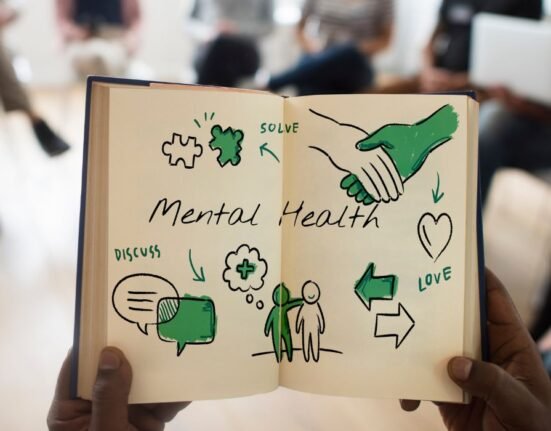If you have ever felt that you never found an ear to listen to you… maybe this shall help. People have always linked mental health with terms like “mental disorder,” “being crazy,” or “madness.” Living in the 21st century, does this belief still exist in this era of development? Unfortunately, yes, it does and will always do unless we believe in bringing a change. Albert Einstein said “The world as we have created it is a process of our thinking. We cannot change it without changing our thinking. Our thoughts, in the scientific term ‘cognition’, matter the most to bring a small change. Let us first understand what exactly does Mental Health mean.
Seeking Help For Mental Health
Well-being includes physical, emotional and mental health. WHO clearly defines “Mental health as a state of well-being in which every individual realizes his or her own potential, can cope with the normal stresses of life, can work productively and fruitfully, and is able to make a contribution to her or his community.” Hence, to live a healthy life it becomes important to seek a mental health professional who can help you find healthy ways to cope with stress just the way we consult a physician in case of a physiological ailment.
At this point, a professional counsellor or psychologist can assist in identifying the issues faced by health professionals. They provide counselling, and psychotherapy, or refer to psychiatrists for moderate to severe diagnoses as needed.
First, it is important to seek help at the earliest for a proper channel of treatment. According to DSM-IV, “mental Disorder is conceptualized as a clinically significant, behavioural or psychological syndrome or pattern that occurs in an individual and that is associated with personal distress or impairment in one or more areas of functioning and a response that is not culturally expected or sanctioned. The pattern may be currently considered a manifestation of behavioural, psychological or cognitive dysfunctional in an individual.”
Hence, mental health professionals identify and diagnose a mental disorder when there is a significant dysfunction affecting daily, occupational, and leisure activities. Every person who seeks help from a mental health professional does not necessarily have a clinically diagnosed mental disorder. Well-trained professionals identify and refer individuals accordingly.
It is necessary to learn more about different professionals in the field of mental health. Mental health professionals include a psychiatrist ( who holds an MD) who diagnoses moderate to severe mental disorders and prescribes medication; Clinical psychologist (must be an RCI registered M.Phil.) who identifies mental disorders, does assessment and provides psychotherapy; Counselling Psychologist (must have M.A./M.Sc.) provides intervention for an individual with daily life stresses and mild mental health issues; and Psychiatric Social Worker who works on the community level. Regardless of their specific areas of expertise, all of them are embedded with the same aim. Helping others find coping strategies to deal with any situation in their life by themselves and tap their potential.
Myths around Mental Health
As the word Mental Health comes to mind, there are several myths attached to it which makes it difficult for many individuals to seek the help that is needed. Let’s focus on debunking these myths:
Myth #1
Counselling and Psychotherapy is only for mental illness.
Fact:
Some individuals diagnosed with mental disorders seek psychotherapy. Counsellors and psychologists also assist with everyday problems like relationship issues, anxiety, sadness, grief, and career-related concerns. Thus, not just those diagnosed with mental illness can seek counselling or psychotherapy, but also those who just need someone to talk to can also approach.
Myth #2
People will think “I am mad.”
Fact:
Admitting to a problem and seeking help takes courage and a sign that you still have the strength to deal with life. Non-judgmental and trained professionals actively listen and guide individuals to find solutions for themselves, which is often what is required.
Myth #3
Men are Strong, they don’t cry and need no help.
Fact:
Mental health professionals are neutral when in session. They show no bias in terms of age, gender or sexual orientation. Studies indicate that women are more vulnerable to mental health issues, especially anxiety and mood disorders. However, recent studies show that men seeking mental health services has increased in the past 5 years, suggesting they are more in touch with their feelings. Trust us boys there is no shame in that, in fact, people like gender-neutral attitudes from others!
Myth #4
Mental well-being Help is for the weak or should be within the boundary of the home.
Fact:
Seeking mental health help indicates bravery. Furthermore, counselling helps to empower others, better coping strategies and help the individual find their own strength.
Myth #5
There is no healing without medication.
Fact:
Only a psychiatrist prescribes medicine. Mental health professionals often recommend medication, particularly for specific disorders such as Schizophrenia, bipolar disorder, and substance use disorder. This is typically done in conjunction with psychotherapy.
Myth #6
Mental health issues are not real problems and mental health professionals are not reputable.
Fact:
Mental health professionals hold advanced graduate degrees and undergo several hours of supervised training before treating patients. All of them also abide by laws such as the Code of Ethics, the Mental Healthcare Act (2017) and their associated governing bodies.
A 2015 study conducted by the World Health Organization shows that one in five Indians, equivalent to 200 million people, may suffer from depression in their lifetime, indicating that mental health issues are real problems. Due to the stigma associated with mental illness, a lack of awareness, and limited access to professional help, only 10-12% of these sufferers will seek help.
Read: How to Help a Friend in a Mental Health Crisis?
Myth #7
Mental health issues are not real problems and mental health professionals are not reputable.
Fact:
Mental health professionals hold advanced graduate degrees and undergo several hours of supervised training before treating patients. All of them also abide by laws such as the Code of Ethics, the Mental Healthcare Act (2017) and their associated governing bodies. Mental health issues are real problems — a study conducted by the World Health Organization in 2015 shows that one in five Indians may suffer from depression in their lifetime, equivalent to 200 million people. Due to the stigma associated with mental illness, a lack of awareness, and limited access to professional help, only 10-12% of these sufferers will seek help.
Myth #8
Counselling is a quick fix for all your problems
Fact:
There is no quick healing for mental health issues. It’s just like if you lose weight or gain six packs quickly, it doesn’t last long and lose all your efforts. As it takes time to strengthen your body, you need to give time to your brain too. It involves just these rules committing to the help taken, patience, persistence and practice.
The Live Love Laugh Foundation (TLLLF)’s National Survey Report 2018 indicated that while 87% of the sample showed some awareness of the mental illness, however, 71% also used terms associated with stigma. Although awareness and stigma are separate, there seems to be some link. Therefore, addressing both is necessary to end the stigma of mental illness in India. Continuing to perceive mental well-being helps with apprehension and fear of being labelled and prevents us from seeking the required support.
As human beings, we tend to use clinical mental illness-like adjectives. By using clinical terms casually or teasing, such as saying “l have depression” when you may be sad, “He or she has OCD” which is more than just being tidy, etc., we add to the stereotype which may or may not be true. This spreads misinformation, making it difficult for individuals to seek support due to fear of teasing and labelling.
Conclusion
Mental health awareness campaigns all year round have yielded positive outcomes, helping debunk the stigma against mental illness. Several organizations, such as TLLLF by Deepika Padukone and Scarf India, along with individual initiatives like Mansa for Mental Health Awareness, involve professionals, students, and those who have sought help. They actively hit the streets to spread awareness about mental illness and normalize the idea of seeking support. These campaigns gained popularity because many celebrities, both national and international, had the courage to talk about their battle against mental illness through the media. This is the first step toward change and helps people with acceptance. Don’t be ashamed of your story. Support your family, and friends and inspire them to take the first step towards well-being!
Read More Related Articles
Are our breath, Food and mental health interrelated?













Leave feedback about this